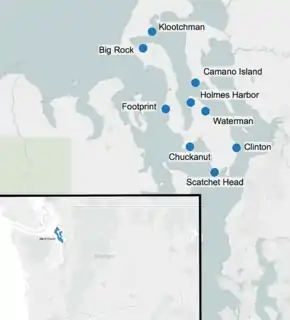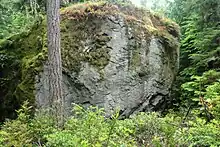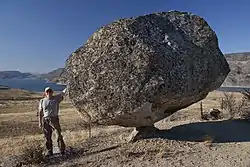Glacial erratic boulders of Island County, Washington
Glacial erratic boulders in Island County are a remnant of the Pleistocene glaciation that created Puget Sound and transformed the surfaces of what are now Island County's main landmasses: Whidbey Island and Camano Island. South of Deception Pass, the two islands' surfaces and beaches are completely composed of glacial till.[1][2]: 5 Abundant glacial erratic boulders lie on the islands, their beaches, and under the near-shore waters.[3][4]

Locations of glacial erratics in Island County.
List of boulders
| Big Rock, once known as the Rock of Ages, is a 30-foot (9.1 m) high greenstone erratic and a landmark on Main Street in Coupeville, at one time considered for a city conservation easement.[5][6][7] | |
| Camano Island State Park erratic is on the south cliff trail in Camano Island State Park, overlooking Saratoga Passage.[8] | |
| Chuckanut erratic is a 10-foot (3.0 m) tall Chuckanut Formation sandstone boulder on the beach below Double Bluff.[9] | |
| The Clinton erratic is a greenstone boulder with north-south glacial striations, at the corner of Conrad St and Berg Road above the ferry terminal in the town of Clinton. The rock and Coupeville's Big Rock were used to calibrate 36Cl radiometric dating due to the well established date they were deposited and began to receive cosmic ray bombardment.[10][11][12] | |
| Footprint Rock is a boulder near Smugglers Cove on Whidbey Island's west side. The rock, high in the intertidal zone, gets its name from a "footprint like impression".[4] | |
| The Holmes Harbor erratic is on the eastern shore of Holmes Harbor, and is somewhat taller than a man.[13] | |
| Klootchman Rock (also spelled Kloochman) is metamorphic rock boulder with white veins. The 35-foot (11 m)[14] tall boulder topped with grass, and its broken shards sit at the base of Blowers Bluff between Penn Cove and Oak Harbor.[15][16] The rock has a National Geodetic Survey control station at its highest point.[14] There is a submerged feature (bar) also called Klootchman Rock about 100 meters offshore.[17] | |
| Scatchet Head erratics are on the beach below bluffs at the southwest point of Whidbey Island.[18] | |
| Waterman Rock is a house-sized greenschist erratic with a circumference of 155 feet (47 m) and height of 38 feet (12 m)[9] to 40 feet (12 m) or greater[19][2]: 5 in Saratoga Woods Preserve near Langley.[6][20][21] It may be the second largest erratic in Washington State, after the Lake Stevens Monster.[9] The property including the rock was acquired in 2002[2]: 4 or 2005[19] for conservation. |  |
References
- Tucker 2010a.
- Whidbey Camano Land Trust; Island County (August 2010), Saratoga Management Plan (PDF), Island County Parks
- Haugerud 2008.
- Mary Jo Adams; Judi McD. (March 7, 2008), Intertidal Monitoring - 2007, Coupeville, WA: Washington State University Island County Extension
- "UW professor puts Big Rock in its geologic place", South Whidbey Record, June 25, 2008, archived from the original on June 9, 2015
- Burnett, Justin (January 4, 2012), "Big Rock for sale: Giant stone goes with Coupeville apartments", Whidbey News-Times, retrieved June 1, 2015
- Whalen, Nathan (January 27, 2012), "Coupeville Town Council unmoved by Big Rock", Whidbey News-Times, retrieved June 1, 2015
- Tom Barr (July 3, 1991), "Camano Island State Park Offers Wide Choice Of Facilities, Activities", The Seattle Times
- Tucker 2010b.
- University of Washington Earth and Space Sciences 2010
- Swanson 2009, p. 7.
- Terry W Swanson; Marc L Caffee (January 2003), "Determination of 36Cl Production Rates Derived from the Well-Dated Deglaciation Surfaces of Whidbey and Fidalgo Islands, Washington", Quaternary Research, 59 (1): 132–134, doi:10.1006/qres.2001.2278, S2CID 131251443
- Western Geo Hikes 2008.
- National Geodetic Survey PID TR1338, "Blowers Bluff Klootchman Rock"
- Hugh Shipman (May 9, 2011), "Klootchman Rock", Gravel Beach (blog)
- Overton, Harold L. (June 20, 2012), Quadransphere of North America
- U.S. Geological Survey Geographic Names Information System: Klootchman Rock
- R.C. Ray (1891), The Coast of British Columbia Including The Juan de Fuca Strait, Puget Sound, Vancouver and Queen Charlotte Islands, United States Navy Hydrographic Office/Government Printing Office, p. 29
- "County sets Southend rockin'", South Whidbey Record, June 25, 2008, archived from the original on February 1, 2016, retrieved June 9, 2015
- Sheets, Bill, "Big boulder in Edmonds one of many left by long-gone glaciers", Everett Herald, archived from the original on June 21, 2015, retrieved June 1, 2015
- Karen Sykes (January 29, 2003), "Hike of the week: Wandering through Whidbey Island woods", The Seattle Times
Sources
- Mimi Sheridan, "Brief history of central Whidbey Island–natural history" (PDF), Ebey's Landing National Historic Reserve: Self-guided walking tour of historic Coupeville (brochure), U.S. National Park Service, archived from the original (PDF) on 2015-08-12
- Haugerud, Ralph (2008), Nearshore surveys with LIDAR (PDF), United States Geological Survey – via Washington Department of Ecology
- Tucker, Dave (February 11, 2010), "Whidbey Island erratics", Northwest Geology Field Trips
- Tucker, Dave (July 2010), "Whidbey Island glacial deposits", Northwest Geology Field Trips
- "Whidbey Island: Glacial erratics", Western Geo Hikes, January 29, 2008, archived from the original on 2015-06-10
- Whidbey Island Glaciation (ESS 210) (PDF) (Field trip handbook), University of Washington Department of Earth and Space Sciences
- Swanson, Terry W. (2009), Late Pleistocene Glacial History of Whidbey Island, WA (PDF) (Field trip handbook), University of Washington Department of Earth and Space Sciences
This article is issued from Wikipedia. The text is licensed under Creative Commons - Attribution - Sharealike. Additional terms may apply for the media files.
